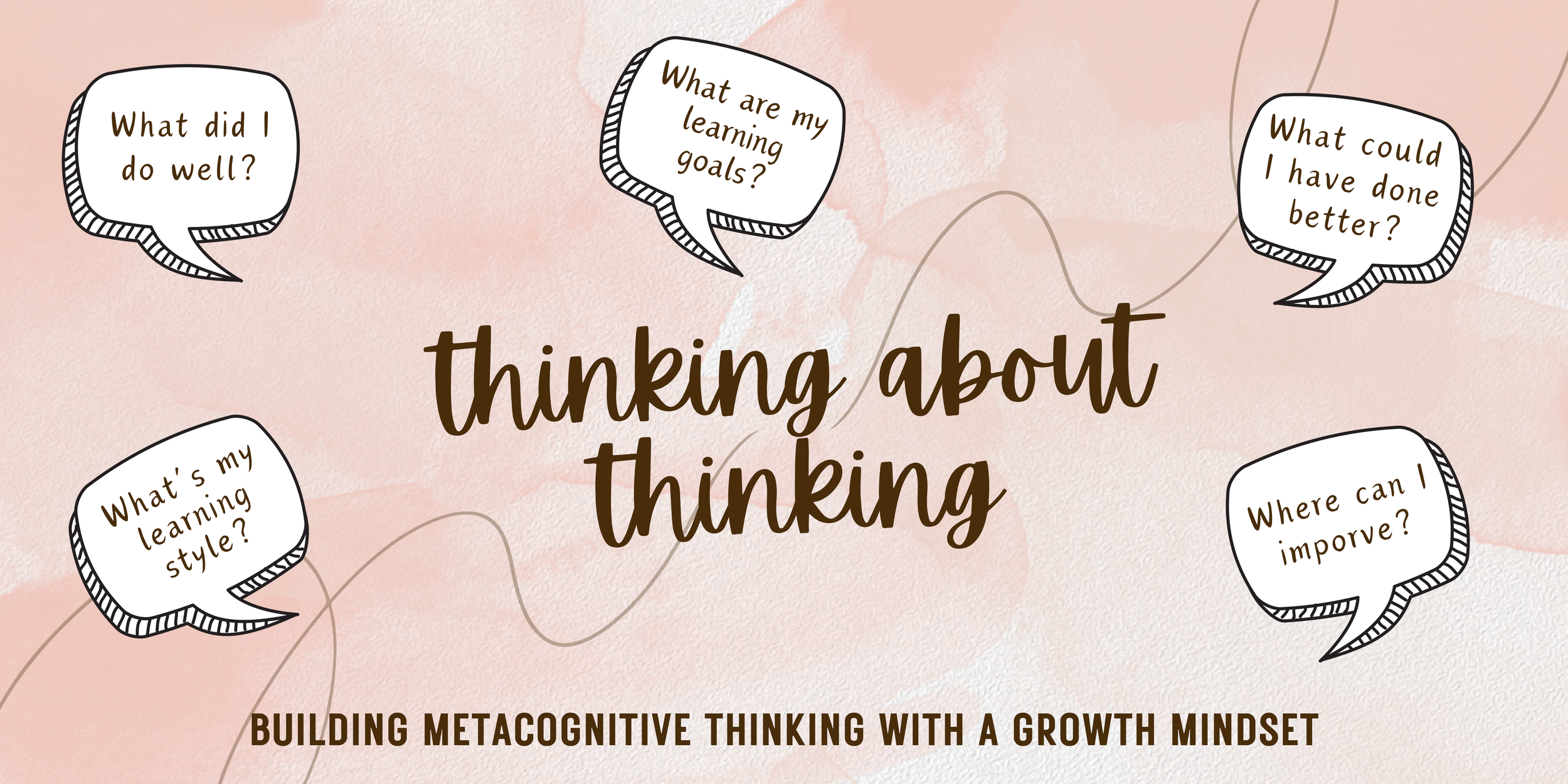Metacognitive Strategies
Metacognition, the ability to monitor and reflect on one’s thinking, plays a pivotal role in education. Its implementation in the classroom cultivates a disposition towards lifelong learning, supports self-regulation, and nurtures a growth mindset.
Students become life-long learners when they think about their thinking. Encouraging students to engage in metacognition, a higher-order cognitive skill, prompts them to critically assess and refine their thinking processes. This practice leads to a profound understanding of their optimal learning methods and enables the application of tailored strategies aligned with their individual strengths and styles. Metacognitive proficiency transcends specific subjects, empowering students to extend these skills beyond the classroom, taking charge of their own learning and perpetuating a lifelong learning journey.
By incorporating metacognitive strategies such as goal-setting and self-monitoring, students develop self-regulation. This process is particularly crucial in recognizing that behaviors are not simply labeled as 'good' or 'bad,' but rather as factors that either bolster or hinder academic success. Some students may require guidance in cultivating self-regulation skills essential for success in an academic setting. By understanding and recognizing their zone of proximal development, we can meet these students precisely at their current level of ability, providing them with the tailored tools and guidance they require to be able to access and independently apply these strategies, fostering self-regulation and academic autonomy. This approach ensures that every student's journey towards self-regulation is purposeful and successful.
Metacognition is instrumental in fostering a growth mindset. By monitoring and reflecting on their learning journey, rather than fixating on grades, students come to appreciate learning as a dynamic, evolving process that can be developed over time. Providing mastery-oriented feedback that centers on the process, rather than evaluative statements about the learner, reinforces this growth mindset and propels student achievement. With this perspective, students are more inclined to persevere through challenges and embrace mistakes as invaluable opportunities for learning and personal growth.
Undoubtedly, metacognition is a fundamental skill that empowers students to become independent, self-regulated learners who are equipped to navigate the intricacies of the learning process. As educators, we hold the power to instill and nurture this skill within our classrooms, preparing students for lifelong learning and success.
In the classroom…
Teaching metacognition, like any skill, involves a thoughtful cycle of explicit instruction, deliberate practice, mastery-oriented feedback, and guided reflection. By incorporating these elements into our teaching approach, educators equip students with invaluable tools to navigate the complexities of learning and personal growth.
Explicit Instruction
One crucial aspect of teaching metacognition is providing explicit instruction. This encompasses lessons on understanding the brain's functioning and recognizing stress responses, along with techniques for regulation. Incorporating think-alouds to demonstrate problem-solving strategies and offering sentence stems for conflict resolution are just a few effective strategies. By providing a structured foundation, students gain insight into their own cognitive processes.
Practice for Proficiency
Research demonstrates that when learners actively engage in practicing self-regulation skills, they are actively building neural pathways that enhance their ability to manage stress in the future. Encouraging students to notice their strengths and areas for improvement becomes a foundational practice. This process not only fosters self-awareness but also cultivates a sense of agency over one's learning journey.
Mastery-Oriented Feedback
Shifting the focus from grades to skills is a fundamental shift in the approach to feedback. Rather than emphasizing a grade-oriented outlook, it is crucial to provide feedback that is mastery-oriented. This approach delves into specific skills and knowledge demonstrated (or not demonstrated) in an assignment. Teaching students to assess their own work against defined criteria and revisiting older feedback ensures continuous growth. By centering on skill development, students are poised for sustained improvement.
Reflection
Reflection plays a pivotal role in the metacognitive journey. Encouraging students to reflect on their learning through guided prompts allows them to internalize their experiences. This reflection process extends to smaller assignments and over time to identify recurring patterns. Introducing student-led conferences, where students compile portfolios showcasing their assignments, feedback, and reflections, offers a powerful mechanism for setting and tracking learning goals.
Teaching metacognition is a dynamic and transformative process that empowers learners to take charge of their education. Through explicit instruction, purposeful practice, targeted feedback, and guided reflection, educators create an environment where students not only learn content but also acquire essential lifelong skills. By integrating these elements into our teaching practices, we equip our students to thrive in the ever-evolving landscape of learning.
-
Barber, S. (2022, November 4). Making Metacognition Part of Student Writing. Edutopia. https://www.edutopia.org/article/making-metacognition-part-of-student-writing/
Brookhart, S. M. (2011). How to assess higher-order thinking skills in your classroom. Hawker Brownlow Education.
Kieran, L., & Anderson, C. (2019). Connecting Universal Design for Learning With Culturally Responsive Teaching. Education and Urban Society, 51(9), 1202–1216. https://doi.org/10.1177/0013124518785012
Metacognition. (n.d.). Retrieved November 2, 2023, from https://www.queensu.ca/teachingandlearning/modules/students/24_metacognition.html
Murphy, E. (2009). A framework for identifying and promoting metacognitive knowledge and control in online discussants. Canadian Journal of Learning and Technology / La Revue Canadienne de l’apprentissage et de La Technologie, 34(2). https://doi.org/10.21432/T2SW2V
Nuhfer, E. (2022, August 29). Metacognition and Mindset for Growth and Success: Part 1 – Understanding the Metacognitive Connections between Self-Assessment and Mindset. Improve With Metacognition. https://www.improvewithmetacognition.com/metacognition-and-mindset-part1/
Resnick, L. B., & Flavell, J. H. (1976). Metacognitive aspects of problem solving. In *The nature of Intelligence* (pp. 231–235). essay, Lawrence Erlbaum.

